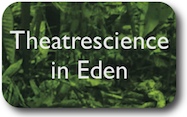Performing in Cornwall
Dr. Jessica Mordsley elaborates on the performance conditions in cornwall
Performances were scheduled to take place at Eden from 17-25 November. However, on the day the plays were meant to open (17th November 2010), Cornwall was struck by severe flooding. For the first time in its ten-year history, the Eden Project had to close due to the extreme weather conditions, resulting in the cancellation of the first three performances.
This was obviously a huge setback after many months of intricate planning for staging the plays at Eden. However, the team worked extremely hard and managed to relocate the events for Saturday 20th November – the core ‘showpiece’ day featuring the book launch for State of Nature and a panel discussion in addition to the performances of State of Nature and the young writers’ plays – to the Lost Gardens of Heligan. On the following day, Sunday 21st November, with the support of Professor Anthony Pinching, the production was moved to The Knowledge Spa at Royal Cornwall Hospital, Truro. The plays were finally performed at Eden for three days from the 23rd to 25th November.
Despite this disruption, the audience at Heligan arrived in even greater numbers than originally expected at Eden. Almost every guest who had booked to attend at the Eden Project transferred their ticket to the new venue and, despite being 20 degrees colder than the intended venue in the Eden biome, the plays and talks went ahead with excellent feedback from the audience.
The programme was introduced by Theatrescience directors Jeff Teare and Rebecca Gould, who explained the reason for the move to Heligan and the background to the project.
The day opened with performances of the three young writers’ plays.
After lunch, State of Nature was performed. The only full-length play produced for ‘Not My Fault’, it is an insight into the life and mind of Patrick, who is suffering from an aggressive form of dementia called Lewy Body. The play opens with his niece, Louise, arriving to take on the role of carer at Patrick’s rambling house in the Cornish countryside. Throughout the play, Patrick’s memories of his youth in 1960s India, where he took part in the Naxalbari Uprising and met the love of his life, physically invade the stage, so that for the audience as well as for Patrick, the events in the Indian forest become more vivid and real than the world he now inhabits. We also learn during the play that Patrick’s father and brother (Louise’s father) may both also have died from the same illness, raising the possibility that Louise herself may face a similar future. The tension between Louise’s Christian faith and nonbeliever Patrick, in the face of the realities of dementia, also runs through the play. The boundaries between past and present visibly break down. Despite the change of venue from a tropical biome to a freezing and wet Cornish garden, responses to the play were extremely positive.
The audience then saw extracts from the two plays in development, Selma Dimitrijevic’s Extremely Brief and Violent and Alison Falconer’s 50/50, followed by Q&A sessions with the playwrights, chaired by Dr Richard Davies, director of Parthian Books.
The day culminated in a panel discussion, also chaired by Dr Davies, with the panellists Simon Turley (writer of State of Nature), Professor Anthony Pinching (State of Nature scientific advisor) and Shelagh Otway (Locality Manager for Devon, Cornwall and the Isles of Scilly, Alzheimer's Society).
Video recordings of State of Nature by Simon Turley, The Short Plays and Theatrescience's workshops at the Eden project have been archived on this website and can be found by following the links below:
Comments
You can leave comments on the video here by using Twitter!
Just post with the hashtag #IATLTheatrescience in your tweet.



